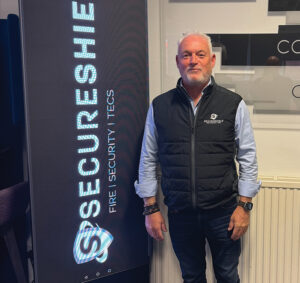
John Hunter is the managing director at Secureshield, the NSI certified company with offices in Motherwell and Newcastle.
What are your company’s main business activities?
In general, we design, supply, install and maintain fire critical systems, CCTV, access control and we are currently providing a lot of technology enabled care solutions in the social housing space. We do BS 5839 Part 6 fire in these environments and dispersed tech systems as well. Beyond that, we have a number of ongoing government and emergency services projects.
Last year, we became part of Ranger Fire & Security, which is bringing together high performing businesses in the sector to collaborate, share knowledge and cross-selling opportunities. While we still operate as Secureshield, being part of the Group means we can offer a wider range of services under one roof, making it easier for our customers to access reliable and accredited solutions for all their security needs.
What emerging technologies do you see shaping the future of the industry, and how is your company adapting to stay ahead of the game?
The main issue for us right now is the self-testing of fire systems. The latest remote diagnostics systems are great for us, especially because of the geography in Scotland where we could be many miles away from the client or they could even be on a distant island! Sometimes the sailing part of the journey could take a number of hours, plus the time to get to the ferry by road. So remote diagnostics and self-testing are absolutely fantastic features of fire technology which allow us to provide high quality services. For example, the CLSS cloud platform from Honeywell enables us to manage remote sites all from a PC.
In what way does NSI certification differentiate your company from competitors and enhance your credibility within the industry?
From our perspective, third party certification shows that we operate to the highest industry standard – it is as simple as that. We are a large organisation at Secureshield with around 80 staff working across two branches, Newcastle and Motherwell. Ensuring that everybody is on the same page at the same time can be challenging sometimes, but with the NSI certification and all of its governance, nobody is working independently at a lower standard. Everybody gets the relevant training, coaching, support etc, and that is a major comfort to us knowing that we are operating at a high level across the board.
How has the rise of smart and home automation technology influenced your business and the services you offer?
It has become a major part of what we do. We are currently working with a huge client who is removing high-rise blocks of flats form their portfolio and replacing them with smaller individual dwellings. We are looking at using home automation to secure the properties and allow the homeowner to control various systems in the property. By using a tablet or handheld device the client can operate the heating system, pay bills and manage security all in one place. I think this is definitely the direction in which technology is heading for future generations of homeowners and tenants.
In your opinion, what is the most common misconception or myth about the security industry?
Probably that it is easy to install. I am not a qualified engineer, but I can have a go at fitting a CCTV system and probably get it working. I could maybe do the same with a fire system or an intruder system, but the truth of it is that I am not the guy to do that, because it is not my skill set, yet people do attempt to install security equipment when they are not qualified. There are individuals who are starting their businesses without having any governance or compliance measures in place. That is why we need the NSI in the sector. However, it goes beyond that, because you must take into consideration GDPR and data protection and that is now a huge part of what we do. It is not just a case of fitting a system in the building and then moving on to the next job. An unqualified guy with some electrical knowledge installing a burglar alarm is not the same as an NSI certified business.
Read the full interview in the May 2025 edition of PSi magazine




